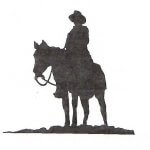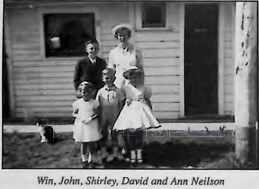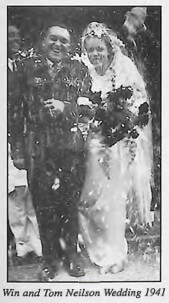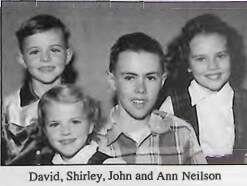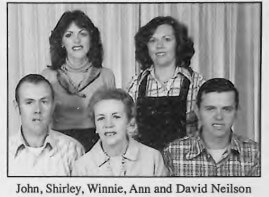Written by Ann (Neilson) Beattie and John Neilson A War Bride's Story pg 246 More Big Hill Country 2009
Winifred (Win) lived in Cochrane from 1953 until her death in 2007. Winifred Mary Allen was the only child of Thomas Edward (Ted) Allen and Winifred Edith Davey who had married in 1917 in England. Apparently her birth, on July 12, 1920, occurred just a few days before the historic first trans-Atlantic two-way radio broadcast. Her father was in the British Navy during World War I and, after that war, he and Win’s mother worked as a chief butler and a head housekeeper in stately homes throughout southern England. As a child, Win rarely lived with her parents because of the nature of their work – today we would say they were “on the job 24/7”. Thus Win’s two grandmothers, Margaret Allen and Mary Ann Davey, nurtured and raised her – mostly the latter. In fact, at 63 years old, Granny Davey actually delivered Win at home in the small village of Iping, Sussex, having developed skills as a mid-wife to military families while raising her own family of nine in Victorian London. Win and her Dad shared a love of music and he had sung in the choir at Worcester Cathedral as a teenager. In her Dad’s later years, his love of gardening became his vocation another gift, he passed along to his daughter.
Win was the youngest grandchild and spent much of her life in the company of adults. She told us about visiting many aunts, uncles and cousins on both sides of her family and being in awe of the elegant homes where her parents worked. Among her favourite relatives was Aunty Reece, her father’s sister, for whom she was a bridesmaid and who, together with Uncle Perce, loved her like a daughter throughout their life.
Growing up in the 1920s in England, Win talked about walking to school, no matter what the distance or the weather, nor how uncomfortable the itchy wool uniform. She changed schools frequently because her parents would find accommodation for her and Granny Davey near their current employer. She was reprimanded by a teacher who observed her long loose thick hair was “unruly” and unfitting for the classroom. After that, Granny Davey always braided her hair before school. Win had no siblings.
She excelled at school and studied both the violin and piano to become an accomplished performer and, later, a teacher. During World War II, she spoke of playing piano for hours at local pubs where everyone gathered for song and fellowship. She travelled to London on the train for the theatre and to visit historic places. Many of her cousins were in the military when she was growing up and she had a stamp collection with stamps from wherever the British navy and army had been engaged. The Brighton beach was a short train ride and, although Win loved the sea, she was terrified of being immersed in open water. For that reason, she encouraged her children to learn to swim.
World War II and Canada
Like many young women in England, the economic and social conditions after World War I leading up to, and during World War II, were integral to her upbringing. She took jobs following school that were the previous domain of men. Win traveled by bicycle as a letter carrier and worked for a local merchant who became the godfather to both John and Ann. Later, she worked in a munitions factory. Of course, wartime daily life was frequently interrupted by air raids and huddling in shelters until immediate danger passed. Food, clothing and other ration programs were the basis for many stories about hardship countered by stoicism and inventiveness like baking without eggs and snaring and roasting wild rabbits.
Not surprisingly, Win was one of the many young English women who met and fell in love with a Canadian soldier and farmer. Thomas Gilmore Neilson, born at Murray Valley west of Olds to Rob and Myrtle Neilson. He and his two brothers, Robert and Donald served in the same area of England and Win and the three brothers had a lot of fun together despite the war.
In late 1941, Win’s paternal Grandma Allen died and, while her Dad travelled to Devon in southwest England for the funeral, she and her mother went to London to buy her silk wedding dress with coupons they had carefully squirreled away and supplemented with offerings from relatives. In later life, we asked our mother if she was scared during the bombings that were so prevalent in and around London. She responded it was all they knew so everyone just ‘made the best of it’. That attitude characterized Win’s entire life
John was born in 1943 and baptized in a gown Win made from the silk of a recovered parachute. Soon after, with the war coming to a close and the death of her beloved grandmother, Win made arrangements to join her husband in Canada. Later, she related she considered this arduous trek just another ‘great adventure’. However, an English lass, who spent her formative years in the most populated and cultured part of England, likely had no idea what she was signing on for! Just imagine the trip across the Atlantic Ocean with a whole shipload of war brides, their children and all their worldly belongings, the emigration processing at Pier 21 on Canada’s eastern coast and the train ride for thousands of miles to Calgary! Then, imagine traveling to the remote quarter-section farm purchased through the Veteran’s Land Act. At first, she and John lived with our grandparents who farmed nearby. The early experiences in Canada must have been overwhelming but, true to her roots, Win made the best of it.
She did tell us the extended Neilson family and local White Creek, Bowden, Innisfail, Olds community was extremely welcoming to her as a new bride with a young child. She joked that everywhere she and our father visited, people would hear her accent, give her a cup of tea, and give my dad a cup of coffee. Win never really liked tea but her polite upbringing prevented her from saying so. When no one was watching, they would grin at each other and trade cups. She talked of travelling for hours to dances around the countryside and sometimes, even at Dartique Hall not far from Cochrane. When John was five years old, along came Ann, then David, then Shirley … in three years and not quite two months. Win recounted to Ann that an extremely heavy snowfall in the winter of 1948 caused concern about whether Win would make it to the hospital from the farm. In preparation, a team of horses and a sleigh took Win to Olds to stay with Tom’s aunt Lottie Logan for two weeks before her delivery date. Win must have had her hands full on a small farm with not a single convenience.
Win and Tom Neilson separated in late 1951. Win packed up all four kids and her belongings and sailed to England where she lived with her parents during 1952-53. John and Ann remember going to parades celebrating the crowning of Queen Elizabeth. When we were growing up in Cochrane, Win would find a way to get her children to any event featuring a visiting member of the royal family. She would dress us all ‘to the nines’ to cheer and wave.
After a short time living and working in southern England, Win decided Canada offered more opportunity for her children. So, again she made arrangements with Somerset House, the Canadian consulate, to set sail. Initially she rented a home on the reserve outside Morley. Then, after a winter in the foothills, with the help of Jim Currie of the Cochrane RCMP, we moved to Cochrane to Herman and Ethel Nelson’s cabins. She was so grateful for Jim Currie’s assistance that she later free hand embroidered a full RCMP crest for him to frame and display in his office when he was promoted. John had continued school by correspondence until we settled in Cochrane where he was glad to no longer wear short pants, a cap and a tie – the uniform required while he was in English schools!
Raising a family in Cochrane
In later life, we understood growing up with just one parent in the 1950’s was somewhat of an anomaly. The Neilsons may not have had an ideal childhood but, as children, we certainly weren’t aware of it. We were supported by the close-knit Cochrane community and we have mostly wonderful memories.
John remembers coming into our cabin and ice on his shoes unexpectedly caused him to skate across the floor. He landed with both palms on the top of the hot old-fashioned cook stove and was severely burned. For weeks Vi Woods, a local nurse, visited to carefully change his dressings and ensure no infection set in. Her care ensured that today, John has not a single scar from that serious injury. Mrs. Nelson, widowed by then, took Win under her wing and remained a dear family friend for the rest of her life. Neighbours in the cabins were Catherine and Martin Hansen and their growing family. Irene Edge remembers taking Win and pre-school Shirley to a vaccination clinic. Across the road was the pool hall and blacksmith shop; of course we were not allowed to go near either! We did, however, deliver the odd casserole to Paul, the shoe repair merchant, who had recently emigrated from Hungary.
We have a photo of David and Shirley in costume for Alberta’s 50th anniversary as a province. Win’s mother had been a tailoress and Win was also a talented and creative seamstress. She decked the two of them out as a bride and groom for a big parade down the unpaved, wooden sidewalk main street in Cochrane. Heaven knows what John and Ann wore because only the ‘adorable two’ were photographed on that occasion! When Shirley and Ann were teenagers, Win always sewed special occasion dresses or remodeled hand me-down outfits from generous friends.
In Cochrane, about the time David started school in 1957, our mother rented the old brick McNamee house built at the turn of the century. Upstairs, the girls shared a bedroom on the west side and the boys shared one on the east. David and John would hang out their window or even sit on the roof to watch nighttime hockey games in the skating rink when they were supposed to be sleeping. We would slide down the bannister to answer the new telephone at the bottom of the stairs. Our telephone number was 29 and often the often the operator would pass along a message from someone who couldn’t reach us earlier.
At that house, Win would often conscript John to babysit the three youngsters when she was volunteering or working at a local ranch. But, industrious as his mother, John also had a paper route. David loved to play with his tractors and trucks in the dirt under the veranda; he’d climb in by lifting a loose board on the steps. Somehow, John would manage to talk Shirley and Ann into joining David under the verandah. Then John would nail the step down and go deliver his papers knowing his child-care responsibilities were covered!
As kids, we walked everywhere because Win could never have afforded a car. In the winter, Win would send all four of us with two toboggans to climb the Big Hill. While she had some well-deserved quiet time, we would freeze our rears sliding down the gullies at breakneck speed. We always knew we would come home to a big roast beef dinner, complete with Yorkshire pudding, rich gravy from the drippings and, possibly a dessert of English bread pudding with fruit at the bottom. Each winter, John would flood the garden behind the house and we would all skate on it. But David was the one who spent the most time there, playing hockey and calling his own play-by-plays.
In the summer, the Neilson kids would pick berries so Win could can or make jam for winter eating. That meant hiking down the railway tracks along the Bow River for Saskatoons or travelling out Lochend road with Janet and Harry Jones to their quarter where we would climb across wind rows of brush to pick raspberries. Win always packed a humongous picnic lunch with fresh baking for these excursions. In the fall, Win and Annie Raby would travel northwest of Cochrane to secret cranberry territory. In winter, we rarely ate any fruit or vegetable that wasn’t canned, pickled, frozen or made into jam by Win.
The McNamee house had an enormous yard by today’s standards. Win always grew a huge vegetable garden and nurtured beautiful flowers. Ann, David and Shirley were often runners, delivering huge sweet pea bouquets fashioned with baby’s breath that grew wild in the ditch, to neighbours and friends all over Cochrane. She was generous with her flowers, but not so with her vegetables. Ann’s friend, Sheila McGonigle, remembers leaving the house after a visit and hopping into the garden to pick a few fresh peas. Sheila also remembers Win’s quick tongue-lashing about how every precious pea was destined for Win’s freezer!
Growing up, the Neilson house was always filled with music. Win taught violin and piano to local children to earn extra money to sustain our family. At night, we have a favourite childhood memory of drifting off to sleep while Win played from memory for hours those wartime melodies and other classical pieces.
Win thought a gainfully occupied child was a well-behaved child. And behaving well was expected of not just us, but of our friends too! Win was quick to correct our manners, our grammar and our general behaviour. To keep me out of mischief, she sent me to piano lessons before the age of six.
Ann started in Cochrane with Marilyn Moore, a talented vocal and piano performer and teacher. Later, Ann went to Mount Royal College for weekly lessons. As Ann advanced to higher piano grades, playing fairly complicated pieces, Win could listen from the kitchen and would call out to remind her about missing a rest in bars #16 and #30! Under Win’s supervision, Ann was taught appropriate marches to play with O Canada or the Maple Leaf Forever at daily morning school assemblies.
David was destined to sing and took voice lessons at Mount Royal for several years. Shirley began with the violin and David would tease her mercilessly until Win interrupted them so Shirley could resume productive practice. The three of us often performed individually and together at community functions. We all competed in annual Kiwanis festivals and played at recitals in Seebe, Cochrane and Calgary. Win would barter her homemaking skills (catering, cleaning, sewing, gardening) with neighbours who would take us to Calgary for music lessons in exchange.
When Shirley became an elementary teacher, a highlight of her career was staging large musical productions that included the entire elementary school at the old Grand Theatre in Nelson. Win loved visiting Shirley to take in these events.
We were not allowed to play the rock ‘n roll music of our youth nor to listen to it when Win was around. I don’t think Win appreciated Elvis Presley’s talent until he was nearly 40 years old! We only listened to country and western music when John was at home and Win was out. One of us would be the lookout so we could quickly tune the radio back to CBC classical before Win walked in the door.
Win led several choirs at the Cochrane United Church for many years. There was never any question about how our family would begin our Sundays. David, Shirley and Ann all sang in church choirs. For almost a decade, Win was also the Sunday School superintendent. And, she led Explorers and assisted with CGIT as Shirley and Ann went through those church groups. Win also led Cubs for a time and was a willing and hard working volunteer when parent support was needed for her children’s extracurricular activities. She helped both John and David achieve their Queen Scout designation.
Growing up, there was always a cat member of our family and, while Win loved all animals, there’s no doubt felines were Win’s favourite. Even in the small two-roomed cabin we had a black and white cat with the very English name of Bunty’. John and Ann and many of their friend particularly remember a yellow tabby Win named Napoleon because he was “short and bossy”.
Long before the pronouncement ‘it takes a village to raise a child’, the Neil on kids lived it. At this time, Mr.
William Andison, the owner of Cochrane’s dry goods store, lived across the street and was a particular favourite of Win’s with his genteel English demeanour and pride in his expansive and beautiful garden. Win and Alice Moore were close friends for years – they shared a love of music, literature and fine crafts. The Jones’ and Annie and Ed Raby were very kind to Win and our family. The Claude Copithornes invited us to watch TV and his huge train/railway set up downstairs fascinated John and David. Our uncle Don and aunt Lorraine Neilson from Weyburn and great-aunt Lottie Logan from our father’s family frequently visited and helped us. Martin and Esther Aarsby, Don and Helen Patterson, Mrs. Colgan, the Desjardins, Ernie Andison, Graham and Mollie Broatch, Vi and George Woods, Don and Alice Thomas and later, Ken and Terri Thompson, Marilyn and Ray Whittle, Nora and Gordon Cohoe, Margaret Beattie’s family, Shirley Patterson and many, many others also helped. For years, Win worked in the homes of farming and ranching families and we grew up with the help of friends like the Edges, Copithornes, Kumlins, Harvies, Bowhays, Whitfields and the list goes on. Win had a special connection with other war brides in the Cochrane area … Betty Hrdlicka, Helen Helfrich, Chris McKay and Doreen Stanton, to name a few.
The Jones’ had a big Ford station wagon and would take us on picnics and camping trips to Banff. At Johnston Canyon Janet and Harry slept in their station wagon and John, after pitching a big canvas tent for us to sleep, would build a huge bonfire to heat rocks for our sleeping bags. Win, as always, prepared and cooked all the food. The Pattersons next door had a large rec room and, in exchange for Win’s housekeeping and sewing assistance to Don and Helen, gave us free reign to have teenage parties there. However, this was the early 1960’s and ours was a strict English upbringing, so, by today’s standards, the parties John and Ann hosted there were certainly tame. But, Win never stinted on food preparation and used her catering and organizational skills to ensure we and our friends had fun.
Win contracted to clean the United Church and hall, the Anglican church and the Legion Hall and sometimes the Rebekah and King Soloman halls for years. Her children were her crew. Like most kids, we probably whined even though we knew it would fall on thoroughly deaf ears.
Win’s love of Christmas
John would go into the forestry area to cut down an enormous Christmas tree every year. Decorating the tree was a prescribed ceremony at the Neilson house. John fastened the lights, each precious ornament was carefully placed and the boys were banished while Win, Shirley and Ann draped the tinsel.
Win loved the look of surprise on her music students’ faces when they first saw ‘The Tree’. On Christmas Eve, she and John would ship the little ones off to bed early so they could carefully arrange gifts under the tree and stuff our stockings. The door downstairs would be locked so there was no chance of us peeking.
The Christmas morning ritual started with us gathering on Win’s bed to open our stockings although we had to listen to the Queen’s annual message before we could start. The dining room table was set formally with appropriate cutlery in exactly the right place the evening before and breakfast was a grand event. Only after a huge breakfast were we allowed to begin the gift opening ceremony. One person at a time opened a gift so that all could observe and appreciate it. Win would work for weeks on Christmas baking. We remember being sent to Mr. Andison ‘s carrying an egg cup for him to fill with just enough sherry for the Christmas cakes. Many gifts were hand made. Win would purchase small items all year long and store them in a secret place. When people were rushing around doing last minute shopping, she would laugh and say she’d finished Christmas shopping the previous August. When the Neilson family first moved to Cochrane, John and Ann remember the local fireman delivering a box of toys they had collected and repaired.
Between Christmas and New Year’s, John would go winter camping and trekking with Scouts . . . Roy Downs was the leader and some of John’s companions were Malcolm Broatch, Rod Fraser, Dave Beattie and Terry Morris among others. Win would bake and mend and then help John stuff everything in an enormous canvas backpack. Then John would sit on the lower back stairs and it would take several of us to hoist the heavy backpack on to his shoulders.
A simple life, well lived
Our mother, Win Neilson, was, in many ways, typical of her generation, especially those who lived through World War II. She simply “made the best of it”. She was hard-working, devoted to her children, fiercely independent and resourceful. What she was able to share with her family and friends, she did. Sometimes it was just laughter but, often, it was the fruit of her labour … home prepared food, fine needlepoint, knitting, crocheting, sewing, her musical talent or her terrific organizational skills.
As John recollects, Win was always a lady. Her English upbringing was evident in her presentation and her speech, although she never thought she had an ‘accent’. She insisted her children use the King English’. Vernice Wearmouth shared the memory that women of that era rarely wore pants.
Win wore dresses to garden, to do housework, for afternoon tea and for special occasions. Ann remembers Eddie Edge and her mother purchasing matching skirts and wearing them to take the kids up the Big Hill for a picnic! And, until the last couple of years, Win’s shoes always had a proper heel because that was how a lady presented herself. In later years, Win didn’t frequently go to church but, in her papers, it was clear, that she maintained a very strong faith for her entire life. She wrote, in a note to John, that she wanted no dreary music or sad scriptures at her final service! She communicated across the miles with family and friends in long, descriptive letters written at night after the children were asleep or on Sunday afternoon when she supervised her children’s writing of obligatory thank-you letters for gifts or favours received.
Win had a sharp mind and, at times, an equally sharp tongue. She could be opinionated and demanding when it came to her expectations for her children, her students, her friends, her grandchildren and, certainly her community. While she depended on her relationships in the community for support to raise her children, she realized the importance of contributing back whatever she could.
Win made it her life’s work to raise four independent, resourceful children. She accomplished that and more. Life didn’t always treat her kindly, but she rolled with the punches and experienced much joy in the simplicity of her journey. “You’ll Never Walk Alone” was one of her favourite pieces. It brought her comfort to know God was by her side through her life’s trials and tribulations.
Win loved the Cochrane area, especially the beauty of the mountains and the foothills. She was always delighted to be taken for a drive in the countryside and was quick to sign up for seniors’ bus trips. She saved every penny so that she could travel occasionally in her sixties and seventies. She made her final trip to England at the age of 76 saying that she found airports just too difficult to navigate. Win spent her last two and a half years living in the Cochrane Bethany where she truly appreciated the care she received. She died September 13, 2007 in the Foothills Hospital from complications following a fall.
John Henry Neilson was born in England in 1943. John married Alice Mabel Cohoe in 1963 and, after initially living and working near Cochrane, they moved, in 1972, to establish their own farm in the Water Valley area south of Cremona. They have two daughters. Brenda Mary is married to Raymond Pereversoff and they live in the Water Valley area with their four children. Marilyn Ann Neil on married Henrik who took her surname. They live in Denmark with their two children.
Leona Ann Neilson was born in Olds in 1948. Ann married David Beattie in Cochrane in 1966. Both worked in the Pembina oilfield near Drayton Valley where their two sons were born. They returned to the Cochrane area in 1985 and recently moved to the Springbank area. Malcolm David Beattie (single) and Sean Thomas Beattie (married to Megan Jean Fenwick) live in Calgary.
David Thomas Robert Neilson was born in Innisfail in 1949. He married Jocelyn Doris Crosse of Hastings, New Zealand in New Zealand in 1985 and Jocelyn emigrated to Canada to farm with David in the Water Valley area. They have a son, Ryan John Thomas and a daughter Michelle Catherine, both single. David, a life-long sports, especially hockey, enthusiast, passed away suddenly at home on March 8, 2007.
Shirley May Neilson was born in lnnisfail in 1951. She married Kimberly Alexander Wik of Kimberly, British Columbia in 1975 and they settled in Nelson, BC. Shirley graduated from the University of Calgary with a degree in Physical Education and was an elementary teacher. She excelled at athletics and created beautiful rock gardens featuring heritage and exotic rose at her lakeside home. Shirley passed away on December 16, 2005 in Nelson after a long battle with cancer. Her two daughters, Allison Claire and Lindsay Alexa, are both single.
